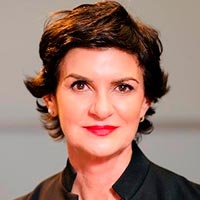Degree in Audiovisual Communications
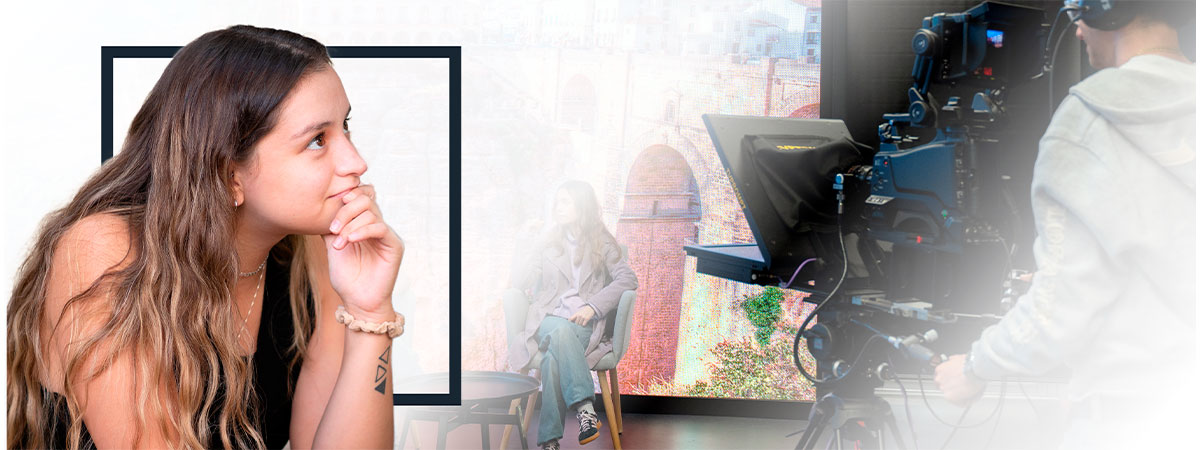
Show your audiovisual talent at the AdN Festival and shine on the big screen
Telling a story and moving the audience may be your goal. But we need tools and knowledge that allow us to make that possible within an audiovisual environment that is experiencing one of its best moments. The audiovisual sector is booming since streaming platforms and new consumption habits appeared, generating a very high demand for productions and professionals in the audiovisual industry, content creators.
As director of the Bachelor's Degree in Audiovisual Communication at Nebrija University, I firmly believe that our studies adapt to what you are looking for; since we have an up-to-date curriculum, a professional, plural and free teaching staff, and new subjects such as Fiction Series or Social Media Video.
You will receive practical training from the very first moment, with bases of knowledge and popular culture, so that the stories you imagine and develop have effect. Activities such as Crush! (instant short film contest), or the classic AdN Short Film Festival, the oldest in Spain of its nature, are waiting for you.”

Rocío Gago Director of the Bachelor's Degree in Audiovisual Communication
Welcome to ADN XX, the Nebrija University Short Film Festival. Cines Callao of Madrid.
Degree adapted to the needs of the audiovisual industry
Curriculum
BOE No 253, of october 18, 2014
Favorable modification approved by the Council of Universities - Fundación para el Conocimiento MADRI + D 06-21-2019.
All our degrees and curricula have been prepared in accordance with the new guidelines set by current legislation, having already been verified by the National Agency for Quality Assessment.
The student must complete 240 credits
First year 60 ECTS
First Semester 30 ECTS- 6 ECTS | Audiovisual Narrative
- 6 ECTS | Audiovisual Technology
- 6 ECTS | Literature and Creation

- 6 ECTS | Communication Theory

- 6 ECTS | Skills Development Seminar I

Second Semester 30 ECTS- 6 ECTS | Fundamentals of Scriptwriting (Scriptwriting I)
- 6 ECTS | History of the Media
- 6 ECTS | Photography:Composition and Aesthetics
- 6 ECTS | Media Law
- 6 ECTS | Graphic Design
Second year 60 ECTS
First Semester 30 ECTS- 6 ECTS | History of Cinema
- 6 ECTS | Scriptwriting Workshop (Scriptwriting II)
- 6 ECTS | Audiovisual Production
- 6 ECTS | Camera
- 6 ECTS | Editing and Montage
Second Semester 30 ECTS- 6 ECTS | Directing Photography and Lighting
- 6 ECTS | Contemporary Art
- 6 ECTS | Fictional Series
- 6 ECTS | Business and its Environment
- 6 ECTS | Skills Development Seminar II

Third year 60 ECTS
First Semester 24 ECTS- 6 ECTS | Principles of Film Directing
- 6 ECTS | Scriptwriting in Non-Fiction Genres (Scriptwriting III)
- 6 ECTS | Postproduction
- 6 ECTS | Development of Interpersonal Involvement and Solidarity
Second Semester 36 ECTS- 6 ECTS | Art Direction and Stage Design
- 6 ECTS | Sound Postproduction
- 6 ECTS | Directing Actors
- 18 ECTS | Assessment of Business Skills
Fourth year 60 ECTS
First Semester 30 ECTS- 6 ECTS | Television Production
- 6 ECTS | Social Media Video y Marketing contents
- 6 ECTS | Digital and 3-D Animation Lab
- 6 ECTS | Advertising Creativity
- 6 ECTS | Skills Development Seminar III
Second Semester 30 ECTS- 6 ECTS | Film Analysis Workshop
- 6 ECTS | Videogame and App Lab
- 6 ECTS | Modern Languages
- 12 ECTS | Final Research Project

More information on these subjects
- 6 ECTS | Development of Professional Skills I

- 6 ECTS | Development of Professional Skills II
- 6 ECTS | Development of Professional Skills III

The recognition of 6 credits will be assessed depending on the different activities that the student performs throughout his/her degree. They will be awarded for university cultural activities, sports, student representation, solidarity and cooperation, or for taking one of the following subjects: Ethics of volunteering or Human Rights.
Program which aims to promote the practical training of students, under the continuous supervision of the Department of Professional Careers of the University, the academic department corresponding to the degree and the company or collaborating institution where the practices are carried out. Advice is provided on the internship and there is follow-up and tutoring, always taking into account the professional orientation of each student.
More information on Company InternshipsThis work supposes either the development of research tasks or the creation of a professional project of a practical nature by the student under the advice of one or more professors of the Department and, occasionally, of professionals from the business world.
Through the transversal subjects you will be able to complement your education and complete your CV in a practical, collaborative and fun way.
It is a voluntary program with no added cost. Upon completion, you will be provided with a diploma.
Access all the informationNebrija University, which is committed to languages and quality, provides the student with added value with the Diploma in English Professional Communication, which will allow him/her to achieve with confidence the competence demanded to successfully join the labor market.
It corresponds to level C1.
More information hereProfessors
| Profesores Professors | Porcentaje de doctores Percentage of PhD holders |
| 35 | 54,28% |
 Rocío Gago Gelado
Directora del Grado en comunicación Audiovisual. Profesora de Producción audiovisual.
Director of the Degree in Audiovisual Communications
Doctora en Ciencias de la Comunicación por la Universidad Rey Juan Carlos (Madrid). Docente en la Universidad Nebrija. Coordinadora de prácticas de la Facultad de Comunicación y Artes. Con más de 15 años de experiencia profesional en el campo audiovisual y la radio, ha trabajado en el área de realización y dirección en series como “Vis a Vis”, “El Barco” o “Los hombres de Paco”.
Rocío Gago Gelado
Directora del Grado en comunicación Audiovisual. Profesora de Producción audiovisual.
Director of the Degree in Audiovisual Communications
Doctora en Ciencias de la Comunicación por la Universidad Rey Juan Carlos (Madrid). Docente en la Universidad Nebrija. Coordinadora de prácticas de la Facultad de Comunicación y Artes. Con más de 15 años de experiencia profesional en el campo audiovisual y la radio, ha trabajado en el área de realización y dirección en series como “Vis a Vis”, “El Barco” o “Los hombres de Paco”.
 Luis Alonso Martín-Romo
Profesor de Literatura y creación y Fundamentos de Guion (Guion I)
Professor of Literature and Creation and Script Fundamentals (Script I)
Luis Alonso Martín-Romo
Profesor de Literatura y creación y Fundamentos de Guion (Guion I)
Professor of Literature and Creation and Script Fundamentals (Script I)
 Jennifer Álvarez Paredes
Profesora de Social media vídeo y marketing de contenido
Professor of Social media video and content marketing
Jennifer Álvarez Paredes
Profesora de Social media vídeo y marketing de contenido
Professor of Social media video and content marketing
 Beatriz Contreras Martínez de Castro
Desarrollo de Competencias Profesionales I, II y III
Professional Skills Development I, II and III
Licenciada en Ciencias políticas y Sociología y especializada en Estudios Sociolaborales. Experiencia profesional en Recursos Humanos y formación laboral. Coordinadora del Instituto de Competencias Profesionales, en la Universidad Antonio de Nebrija.
Beatriz Contreras Martínez de Castro
Desarrollo de Competencias Profesionales I, II y III
Professional Skills Development I, II and III
Licenciada en Ciencias políticas y Sociología y especializada en Estudios Sociolaborales. Experiencia profesional en Recursos Humanos y formación laboral. Coordinadora del Instituto de Competencias Profesionales, en la Universidad Antonio de Nebrija.
 Mónica Delgado Delgado
Profesora de Video corporativo y producción de eventos
Corporate video and event production
Licenciada en CC Información y Postgrado de Comunicación Corporativa y Management en IE Business School. Su formación también se complementó con Master de Protocolo y Relaciones Públicas (Universidad Juan Carlos I); Curso de Reputación On line (ISDI); Curso de Marketing Digital (The Valley) y Programa Executive en Chief Hapiness Officer y Bienestar Organizacional (Universidad UNIR). Con una amplia trayectoria en el ámbito de Comunicación, eventos y Marca, inició su carrera profesional en medios y agencias de comunicación. Más tarde, desarrolló su carrera en el ámbito empresarial como directora de comunicación y eventos en diferentes compañías. Durante 5 años, trabajo en el sector de eventos y producción para clientes como Vodafone y Google, entre otros. Ha sido miembro del European Public Affairs Commitee para Real Estate en Bruselas.
Mónica Delgado Delgado
Profesora de Video corporativo y producción de eventos
Corporate video and event production
Licenciada en CC Información y Postgrado de Comunicación Corporativa y Management en IE Business School. Su formación también se complementó con Master de Protocolo y Relaciones Públicas (Universidad Juan Carlos I); Curso de Reputación On line (ISDI); Curso de Marketing Digital (The Valley) y Programa Executive en Chief Hapiness Officer y Bienestar Organizacional (Universidad UNIR). Con una amplia trayectoria en el ámbito de Comunicación, eventos y Marca, inició su carrera profesional en medios y agencias de comunicación. Más tarde, desarrolló su carrera en el ámbito empresarial como directora de comunicación y eventos en diferentes compañías. Durante 5 años, trabajo en el sector de eventos y producción para clientes como Vodafone y Google, entre otros. Ha sido miembro del European Public Affairs Commitee para Real Estate en Bruselas.
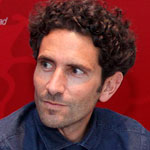 David de la Fuente Franco
Profesor de Desarrollo del espíritu participativo y solidario
Development of the participatory and supportive spirit
Diplomado Universitario en Educación Física, cursando Máster Universitario en Gestión Deportiva (2019) y Técnico Deportivo de varias disciplinas, trayectoria siempre
ligada al mundo del deporte. Actualmente Director del Servicio de Deportes de la
Universidad Antonio de Nebrija (Madrid), miembro del COMADU (Comité Madrileño de
Deporte Universitario), del CEDU (Comité Español de Deporte Universitario) y Asesor
Técnico de Campo a través, Orientación, Fútbol-Sala y Fútbol-7 del Observatorio de
Deporte Universitario de la Comunidad de Madrid. También dirije el Club de Viajes,
Naturaleza y Aventura de la Fundación Antonio de Nebrija, en el que está incluido el
proyecto Polar Raid Universitario, dirigido a estudiantes, profesores e investigadores
interesados en el entorno geográfico del Círculo Polar Ártico.
David de la Fuente Franco
Profesor de Desarrollo del espíritu participativo y solidario
Development of the participatory and supportive spirit
Diplomado Universitario en Educación Física, cursando Máster Universitario en Gestión Deportiva (2019) y Técnico Deportivo de varias disciplinas, trayectoria siempre
ligada al mundo del deporte. Actualmente Director del Servicio de Deportes de la
Universidad Antonio de Nebrija (Madrid), miembro del COMADU (Comité Madrileño de
Deporte Universitario), del CEDU (Comité Español de Deporte Universitario) y Asesor
Técnico de Campo a través, Orientación, Fútbol-Sala y Fútbol-7 del Observatorio de
Deporte Universitario de la Comunidad de Madrid. También dirije el Club de Viajes,
Naturaleza y Aventura de la Fundación Antonio de Nebrija, en el que está incluido el
proyecto Polar Raid Universitario, dirigido a estudiantes, profesores e investigadores
interesados en el entorno geográfico del Círculo Polar Ártico.
 Adrián García del Castillo Sánchez
Profesor de Realización en televisión
Professor of Television Production
Licenciado en C.C. de la Información por la Universidad Complutense de Madrid. Curso de AVID con certificación oficial impartido en CICE. Curso de Realización y guion en TV impartido en IMEFE. Curso de operador de cámara impartido en IORTVE. Curso de Community Manager impartido en INTEC.
Ha trabajado como realizador y ayudante de realización en más de 30 realities como GH, SECRET STORY (Mediaset) , INSIDERS (Netflix) FAMA, A BAILAR (Cuatro y Movistar), LOVE ISLAND (AtresMedia)…Realizador, script y ayudante de dirección en ficcion como VENENO. Ayudante de realización en programas relacionados con el deporte (Olimpiadas Sidney 2000, Wimbledon, MotoGP). Realizador en programas divulgativos en inglés para Vaughan TV. Realizador y editor en programas de corazón como TÓMBOLA (Canal 9). Ayudante de realización y regidor en concursos como TODOS CONTRA 1 y CIFRAS Y LETRAS (TeleMadrid).
Adrián García del Castillo Sánchez
Profesor de Realización en televisión
Professor of Television Production
Licenciado en C.C. de la Información por la Universidad Complutense de Madrid. Curso de AVID con certificación oficial impartido en CICE. Curso de Realización y guion en TV impartido en IMEFE. Curso de operador de cámara impartido en IORTVE. Curso de Community Manager impartido en INTEC.
Ha trabajado como realizador y ayudante de realización en más de 30 realities como GH, SECRET STORY (Mediaset) , INSIDERS (Netflix) FAMA, A BAILAR (Cuatro y Movistar), LOVE ISLAND (AtresMedia)…Realizador, script y ayudante de dirección en ficcion como VENENO. Ayudante de realización en programas relacionados con el deporte (Olimpiadas Sidney 2000, Wimbledon, MotoGP). Realizador en programas divulgativos en inglés para Vaughan TV. Realizador y editor en programas de corazón como TÓMBOLA (Canal 9). Ayudante de realización y regidor en concursos como TODOS CONTRA 1 y CIFRAS Y LETRAS (TeleMadrid).
 Marta González Caballero
Profesora de Narrativa Audiovisual / Taller de Análisis Fílmico y tutora académica de Evaluación de Capacidades en la Empresa.
Audiovisual Narrative / Film Analysis Workshop and academic tutor of Capacity Assessment in the Company
Doctora en Comunicación Audiovisual por la UCM. Acreditada por ANECA y Licenciada en Ciencias de la Información por la misma Universidad. Diplomada en el CAP por la Facultad de Ciencias de la Educación, con especialización en Didáctica de los medios audiovisuales. Profesora Universitaria desde 1998, ha realizado su labor docente en universidades públicas y privadas y en la Escuela de Cinematografía y del Audiovisual de la Comunidad de Madrid (ECAM). Ha trabajado como operadora de cámara en el Congreso de los Diputados y en los Servicios informativos de TVE. Ha desarrollado gran parte de su experiencia profesional en el ámbito de la producción audiovisual para “M&m Producciones”, realizando piezas publicitarias, videoclips y proyectos multimedia. Desde hace dos años, colabora con el Estudio de diseño Dynarange como Audiovisual Manager en Organización de eventos. Ha realizado colaboraciones para Editorial Scriptum y para JC Libros de cine.
Marta González Caballero
Profesora de Narrativa Audiovisual / Taller de Análisis Fílmico y tutora académica de Evaluación de Capacidades en la Empresa.
Audiovisual Narrative / Film Analysis Workshop and academic tutor of Capacity Assessment in the Company
Doctora en Comunicación Audiovisual por la UCM. Acreditada por ANECA y Licenciada en Ciencias de la Información por la misma Universidad. Diplomada en el CAP por la Facultad de Ciencias de la Educación, con especialización en Didáctica de los medios audiovisuales. Profesora Universitaria desde 1998, ha realizado su labor docente en universidades públicas y privadas y en la Escuela de Cinematografía y del Audiovisual de la Comunidad de Madrid (ECAM). Ha trabajado como operadora de cámara en el Congreso de los Diputados y en los Servicios informativos de TVE. Ha desarrollado gran parte de su experiencia profesional en el ámbito de la producción audiovisual para “M&m Producciones”, realizando piezas publicitarias, videoclips y proyectos multimedia. Desde hace dos años, colabora con el Estudio de diseño Dynarange como Audiovisual Manager en Organización de eventos. Ha realizado colaboraciones para Editorial Scriptum y para JC Libros de cine.
 Jesús Manuel González Lorenzo
Profesor de Edición y Montaje
Professor of Editing and Editing
Licenciado en Comunicación Audiovisual por la Universidad Pontificia de Salamanca (2000), Máster en Producción audiovisual (UCM) y Doctor en Creatividad por la Facultad de Bellas Artes de la Universidad Complutense de Madrid (2016). Su trayectoria profesional está orientada al análisis de las cualidades expresivas de los medios y tecnologías de la comunicación y su impacto en los usuarios en ámbitos educativos y creativos. Esta labor ha sido posible gracias a la experiencia laboral desempeñada a lo largo de 17 años como realizador y editor en canales de televisión como Antena 3, Canal +, Comedy Central o Cuatro entre otros.
Además, durante casi cuatro años trabajó como becario del Ministerio de Educación, en el Centro Nacional de Información y Comunicación Educativa (CNICE), en la creación de contenidos multimedia para la mejora de las competencias digitales, experiencia que le permitió participar en el equipo que pondría en marcha en el grupo Sogecable (Actual Prisa TV) los primeros servicios de contenidos audiovisuales en telefonía móvil y web de este país. En la actualidad imparte la asignatura de Medios Tecnología y recursos en la Universidad Nacional de Educación a Distancia (UNED), labor docente que también he desempeñado en otras universidades como la Carlos III o la Universidad Nebrija. También ha colaborado con ARSGAMES (Institución socieducativa) como parte del equipo de coordinación de proyectos educativos con tecnología, robótica y videojuegos; de esta manera, fruto de esta colaboración, ha publicado numerosos artículos y participado como ponente invitado a diferentes jornadas y congresos.
Miembro del Proyecto de Investidación I+D “Desarrollo de competencias y su incidencia en la formación del profesorado: Armonización de procesos educativos entre educación secundaria y universitaria.
Referencia EDU2016-78451-P
ENTIDAD FINANCIADORA: Ministerio de Economía, Industria y Competitividad
Jesús Manuel González Lorenzo
Profesor de Edición y Montaje
Professor of Editing and Editing
Licenciado en Comunicación Audiovisual por la Universidad Pontificia de Salamanca (2000), Máster en Producción audiovisual (UCM) y Doctor en Creatividad por la Facultad de Bellas Artes de la Universidad Complutense de Madrid (2016). Su trayectoria profesional está orientada al análisis de las cualidades expresivas de los medios y tecnologías de la comunicación y su impacto en los usuarios en ámbitos educativos y creativos. Esta labor ha sido posible gracias a la experiencia laboral desempeñada a lo largo de 17 años como realizador y editor en canales de televisión como Antena 3, Canal +, Comedy Central o Cuatro entre otros.
Además, durante casi cuatro años trabajó como becario del Ministerio de Educación, en el Centro Nacional de Información y Comunicación Educativa (CNICE), en la creación de contenidos multimedia para la mejora de las competencias digitales, experiencia que le permitió participar en el equipo que pondría en marcha en el grupo Sogecable (Actual Prisa TV) los primeros servicios de contenidos audiovisuales en telefonía móvil y web de este país. En la actualidad imparte la asignatura de Medios Tecnología y recursos en la Universidad Nacional de Educación a Distancia (UNED), labor docente que también he desempeñado en otras universidades como la Carlos III o la Universidad Nebrija. También ha colaborado con ARSGAMES (Institución socieducativa) como parte del equipo de coordinación de proyectos educativos con tecnología, robótica y videojuegos; de esta manera, fruto de esta colaboración, ha publicado numerosos artículos y participado como ponente invitado a diferentes jornadas y congresos.
Miembro del Proyecto de Investidación I+D “Desarrollo de competencias y su incidencia en la formación del profesorado: Armonización de procesos educativos entre educación secundaria y universitaria.
Referencia EDU2016-78451-P
ENTIDAD FINANCIADORA: Ministerio de Economía, Industria y Competitividad
 Nicolás Grijalba de la Calle
Profesor de Historia del Cine
Film History
Doctor en Comunicación Audiovisual (Universidad Complutense). Licenciado en Periodismo por la Universidad Antonio de Nebrija. Máster en Práctica Escénica y Cultura Visual (UCLM – Museo Reina Sofía). Experiencia en distintos medios como Televisión Española, La Gaceta (Cultura), Servimedia…, y en diferentes revistas culturales. Compagina la docencia con la participación en congresos, seminarios y talleres, en proyectos informativos y culturales y como organizador de eventos y promotor cultural. Conocimientos de interpretación y dramatización en escuelas de teatro como la Cuarta Pared (Madrid). En 2013 estrena su primera obra de teatro (Pareidolia). Coordinador de la ‘Ruta Fílmica’ del festival Filmadrid (2016-2019).
Nicolás Grijalba de la Calle
Profesor de Historia del Cine
Film History
Doctor en Comunicación Audiovisual (Universidad Complutense). Licenciado en Periodismo por la Universidad Antonio de Nebrija. Máster en Práctica Escénica y Cultura Visual (UCLM – Museo Reina Sofía). Experiencia en distintos medios como Televisión Española, La Gaceta (Cultura), Servimedia…, y en diferentes revistas culturales. Compagina la docencia con la participación en congresos, seminarios y talleres, en proyectos informativos y culturales y como organizador de eventos y promotor cultural. Conocimientos de interpretación y dramatización en escuelas de teatro como la Cuarta Pared (Madrid). En 2013 estrena su primera obra de teatro (Pareidolia). Coordinador de la ‘Ruta Fílmica’ del festival Filmadrid (2016-2019).
 Amaya Hernández Sigüenza
Profesora de Fotografía: composición y estética
Photography: composition and aesthetics
Licenciada en Bellas Artes por la Universidad Complutense de Madrid en la especialidad de Artes de la Imagen. Diplomada en Dirección de Fotografía de Cine en la Escuela Universitaria de Artes y Espectáculos TAI y Master en Fotografía Conceptual en la Escuela EFTI. Profesora y tutora en el Master en Fotografía Conceptual en la Escuela EFTI durante cinco años. Docente de Diseño Visual de Contenidos Digitales y Arte Digital. Fotógrafa artística profesional recibiendo importantes premios de reconocido prestigio como Generaciones 2012 de Caja Madrid, Injuve, Premio Bancaja… Ha expuesto de manera individual y colectiva en instituciones como el Círculo de Bellas Artes, el IVAM, La Casa Encendida y el Centro cultural Conde Duque.
Amaya Hernández Sigüenza
Profesora de Fotografía: composición y estética
Photography: composition and aesthetics
Licenciada en Bellas Artes por la Universidad Complutense de Madrid en la especialidad de Artes de la Imagen. Diplomada en Dirección de Fotografía de Cine en la Escuela Universitaria de Artes y Espectáculos TAI y Master en Fotografía Conceptual en la Escuela EFTI. Profesora y tutora en el Master en Fotografía Conceptual en la Escuela EFTI durante cinco años. Docente de Diseño Visual de Contenidos Digitales y Arte Digital. Fotógrafa artística profesional recibiendo importantes premios de reconocido prestigio como Generaciones 2012 de Caja Madrid, Injuve, Premio Bancaja… Ha expuesto de manera individual y colectiva en instituciones como el Círculo de Bellas Artes, el IVAM, La Casa Encendida y el Centro cultural Conde Duque.
 Judith Hidalgo Arana
Profesora de Guión en géneros de no ficción (Guión III)
Screenwriting Professor in non-fiction genres (Screenplay III)
Licenciada en Periodismo en la Universidad Complutense de Madrid, MBA en Empresas de Televisión y workshops de posgrado en la New York Film Academy de Nueva York y Los Ángeles en Filmmaking y Screenwriting con las becas de Jóvenes Artistas de la Comunidad de Madrid y Escritores de SGAE.
Ha desarrollado funciones de dirección, guion y redacción en documentales sociales, programas de entretenimiento y branded content. Le avalan programas como “Eso no se pregunta”, Premio Iris del Jurado y ganador de un Ondas, El Cazador, Esfera, Está Pasando, Viva la Vida, El amor está en el aire, Comerse el Mundo o Control de Carreras. También ha realizado uno de los branded content de éxito para Aldeas Infantiles “Tenemos mucho que decir” donde han participados grandes profesionales de la televisión, como Andrea Ropero, Jon Sistiaga y Olga Lambea.
Además, ha realizado documentales sociales y culturales sobre autismo, flamenco o danza e inclusión.
Judith Hidalgo Arana
Profesora de Guión en géneros de no ficción (Guión III)
Screenwriting Professor in non-fiction genres (Screenplay III)
Licenciada en Periodismo en la Universidad Complutense de Madrid, MBA en Empresas de Televisión y workshops de posgrado en la New York Film Academy de Nueva York y Los Ángeles en Filmmaking y Screenwriting con las becas de Jóvenes Artistas de la Comunidad de Madrid y Escritores de SGAE.
Ha desarrollado funciones de dirección, guion y redacción en documentales sociales, programas de entretenimiento y branded content. Le avalan programas como “Eso no se pregunta”, Premio Iris del Jurado y ganador de un Ondas, El Cazador, Esfera, Está Pasando, Viva la Vida, El amor está en el aire, Comerse el Mundo o Control de Carreras. También ha realizado uno de los branded content de éxito para Aldeas Infantiles “Tenemos mucho que decir” donde han participados grandes profesionales de la televisión, como Andrea Ropero, Jon Sistiaga y Olga Lambea.
Además, ha realizado documentales sociales y culturales sobre autismo, flamenco o danza e inclusión.
 Andrea Jaurrieta Bariai
Profesora de Principios de la dirección cinematográfica
Professor of Principles of Film Direction
Licenciada en Comunicación Audiovisual por la Universidad Complutense de Madrid, donde fue reconocida con el premio a la Mejor Directora de su promoción, Máster en Dirección Cinematográfica por la ESCAC y Diplomada en Arte Dramático por el Laboratorio de William Layton. Combina sus proyectos cinematográficos con su trabajo como profesora de Historia del Cine, Interpretación y Dirección en diversas escuelas especializadas y universidades de Madrid. Así mismo ha impartido Master Class de cine en la Sorbona de París, la ECAM, la Universidad Complutense de Madrid y la ESCAC de Barcelona.
Directora, guionista y productora. Su ópera prima, Ana de día (2018) participó en más de 30 festivales nacionales e internacionales ganando 12 premios que culminaron con su nominación a Mejor Dirección Novel en los Premios Goya de 2019 así como en las Medallas CEC. Acaba de rodar Nina, su segundo largometraje como directora y productora, al mismo tiempo que ha comenzado a producir proyectos ajenos con su productora Lasai Producciones.
Andrea Jaurrieta Bariai
Profesora de Principios de la dirección cinematográfica
Professor of Principles of Film Direction
Licenciada en Comunicación Audiovisual por la Universidad Complutense de Madrid, donde fue reconocida con el premio a la Mejor Directora de su promoción, Máster en Dirección Cinematográfica por la ESCAC y Diplomada en Arte Dramático por el Laboratorio de William Layton. Combina sus proyectos cinematográficos con su trabajo como profesora de Historia del Cine, Interpretación y Dirección en diversas escuelas especializadas y universidades de Madrid. Así mismo ha impartido Master Class de cine en la Sorbona de París, la ECAM, la Universidad Complutense de Madrid y la ESCAC de Barcelona.
Directora, guionista y productora. Su ópera prima, Ana de día (2018) participó en más de 30 festivales nacionales e internacionales ganando 12 premios que culminaron con su nominación a Mejor Dirección Novel en los Premios Goya de 2019 así como en las Medallas CEC. Acaba de rodar Nina, su segundo largometraje como directora y productora, al mismo tiempo que ha comenzado a producir proyectos ajenos con su productora Lasai Producciones.
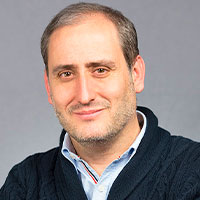 Carlos Jiménez Narros
Profesor de Diseño Gráfico
Graphic design
Doctor por la Universidad Complutense de Madrid. Profesor acreditado por la ACAP. Periodista con experiencia profesional en La Voz del Tajo, Radio Arco Iris y As. Además, ha trabajado en las revistas especializadas: PC Actual, Elektor, Deliberación, Games/consolas y Redes Lan, entre otras. Su trayectoria profesional está centrada en el diseño gráfico, técnicas de autoedición y proyectos de preimpresión y ha diseñado imágenes corporativas y proyectos gráficos para empresas e instituciones. Desde 1994 es profesor de la Universidad Antonio de Nebrija. Es autor de ponencias y comunicaciones en distintos congresos internacionales sobre comunicación, diseño y enseñanza. Su área de investigación está centrada en el diseño gráfico, nuevas tecnologías e innovación docente.
Carlos Jiménez Narros
Profesor de Diseño Gráfico
Graphic design
Doctor por la Universidad Complutense de Madrid. Profesor acreditado por la ACAP. Periodista con experiencia profesional en La Voz del Tajo, Radio Arco Iris y As. Además, ha trabajado en las revistas especializadas: PC Actual, Elektor, Deliberación, Games/consolas y Redes Lan, entre otras. Su trayectoria profesional está centrada en el diseño gráfico, técnicas de autoedición y proyectos de preimpresión y ha diseñado imágenes corporativas y proyectos gráficos para empresas e instituciones. Desde 1994 es profesor de la Universidad Antonio de Nebrija. Es autor de ponencias y comunicaciones en distintos congresos internacionales sobre comunicación, diseño y enseñanza. Su área de investigación está centrada en el diseño gráfico, nuevas tecnologías e innovación docente.
 María del Carmen Llovet Rodríguez
Profesora de Teoría de la Comunicación
Professor of Communication Theory
Doctora en Comunicación Pública por la Universidad de Navarra (2014). Profesora Acreditada por ANECA. Su trayectoria docente comenzó en la Universidad Villanueva, continuó en New York Institute of Technology (campus Pekín) y recientemente en la Universidad Internacional de Cataluña. Periodista de moda y cultura en la agencia especializada en tendencias Aceprensa, ejecutiva de cuentas en la Consultora de comunicación BeConfluence, miembro del departamento de comunicación de la ONG Helsinki España Dimensión Humana y redactora en la sección de Cultura de la agencia informativa Europa Press. HA moderado mesas redondas de encuentros académicos del sector de la moda en el Museo del Traje, y he ejercido labores de gabinete de comunicación para estas jornadas y para el blog de L’Oreal durante la 50 Edición de la Cibeles Mercedes-Benz Fashion Week Madrid. Doctora Acreditada por ANECA en las figuras de Contratado Doctor, Profesor Ayudante Doctor y Profesor de Universidad Privada.
María del Carmen Llovet Rodríguez
Profesora de Teoría de la Comunicación
Professor of Communication Theory
Doctora en Comunicación Pública por la Universidad de Navarra (2014). Profesora Acreditada por ANECA. Su trayectoria docente comenzó en la Universidad Villanueva, continuó en New York Institute of Technology (campus Pekín) y recientemente en la Universidad Internacional de Cataluña. Periodista de moda y cultura en la agencia especializada en tendencias Aceprensa, ejecutiva de cuentas en la Consultora de comunicación BeConfluence, miembro del departamento de comunicación de la ONG Helsinki España Dimensión Humana y redactora en la sección de Cultura de la agencia informativa Europa Press. HA moderado mesas redondas de encuentros académicos del sector de la moda en el Museo del Traje, y he ejercido labores de gabinete de comunicación para estas jornadas y para el blog de L’Oreal durante la 50 Edición de la Cibeles Mercedes-Benz Fashion Week Madrid. Doctora Acreditada por ANECA en las figuras de Contratado Doctor, Profesor Ayudante Doctor y Profesor de Universidad Privada.
 María Teresa Medina Amorós
Profesora de Cámara
Professor of Camera
Licenciada en Ciencias de la Información. Directora de Fotografía de largometrajes como Cosas que nunca te dije, o series como Las Chicas Gilmore. Teresa Medina AEC ha demostrado una gran trayectoria en este campo siendo reconocida por sus compañer@s como Presidenta de la AEC( Asociación Española de Directoras y Directores de Fotografía) en el último trienio. Su nuevo camino está en torno a la dirección formándose en el American Film Institute en el curso intensivo Director Workshop for Women donde realiza el cortometraje Nina y realiza como Directora y Directora de fotografía varias publicidades. Estos últimos años ha desarrollado varios guiones en la prestigiosa UCLA en el Screenwriting Profesional Program y Advance Program.
María Teresa Medina Amorós
Profesora de Cámara
Professor of Camera
Licenciada en Ciencias de la Información. Directora de Fotografía de largometrajes como Cosas que nunca te dije, o series como Las Chicas Gilmore. Teresa Medina AEC ha demostrado una gran trayectoria en este campo siendo reconocida por sus compañer@s como Presidenta de la AEC( Asociación Española de Directoras y Directores de Fotografía) en el último trienio. Su nuevo camino está en torno a la dirección formándose en el American Film Institute en el curso intensivo Director Workshop for Women donde realiza el cortometraje Nina y realiza como Directora y Directora de fotografía varias publicidades. Estos últimos años ha desarrollado varios guiones en la prestigiosa UCLA en el Screenwriting Profesional Program y Advance Program.
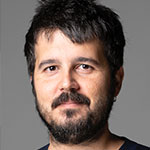 Acoidán Méndez Jiménez
Profesor de Taller de Guion (Guion II)
Script Workshop (Script II)
Graduado en Comunicación Audiovisual por la Universidad Rey Juan Carlos y Master en Guion de Cine y Series de Televisión por la misma universidad. Fundador de la productora Ficciono, proyecto audiovisual basado en el storytelling con el que trabaja para instituciones como la ONCE, la Universidad de Las Palmas de Gran Canaria o el Congreso Internacional de energías nucleares IYNC.
Acoidán Méndez Jiménez
Profesor de Taller de Guion (Guion II)
Script Workshop (Script II)
Graduado en Comunicación Audiovisual por la Universidad Rey Juan Carlos y Master en Guion de Cine y Series de Televisión por la misma universidad. Fundador de la productora Ficciono, proyecto audiovisual basado en el storytelling con el que trabaja para instituciones como la ONCE, la Universidad de Las Palmas de Gran Canaria o el Congreso Internacional de energías nucleares IYNC.
 Alfonso Mendiguchía Hernández
Profesor de Dirección de actores
Directing Actors
Doctor en Comunicación por la Universidad Pontificia de Salamanca. Licenciado en Ciencias de la información por la UPSA. Estudios de Doblaje en la academia AM (Madrid). Cursos de voz, verso, dirección e interpretación con profesores como Alfonso Romera, Dennis Rafter, Lluís Pascual...Ha sido miembro fundador de las compañías ‘La Máscara’, ‘Malagüero teatro’, ‘Capicúa’, ‘Intrussion’, ‘trío de ases’ y ‘Los absurdos teatro’. Como actor de teatro ha estrenado más de cincuenta espectáculos tanto de sala como de calle con sus propias compañías y con otras como ‘Feelgood’, ‘Proyecto 43-2’, ‘Mosaico Mercurio’, ‘La Troupe’, ‘calle 11’, ‘S.A.C.’, ‘La Radical’ o ‘La partida’. En televisión ha participado como actor en series como 7vidas, Aida, La familia mata, Hispania, Sin tetas no hay paraíso, Doctor Mateo, Los exitosos Peels, Ascensores, Cuéntame, La que se avecina, Los Serrano, SMS, Yo soy Bea, 90-60-90, Cuestión de Sexo, LEX, Luna (el misterio de Calenda), Águila Roja, Amar es para siempre, El secreto de Puente Viejo, El incidente, Bajo Sospecha, Acacias 38, Centro Médico, además de en una treintena de campañas publicitarias.
Alfonso Mendiguchía Hernández
Profesor de Dirección de actores
Directing Actors
Doctor en Comunicación por la Universidad Pontificia de Salamanca. Licenciado en Ciencias de la información por la UPSA. Estudios de Doblaje en la academia AM (Madrid). Cursos de voz, verso, dirección e interpretación con profesores como Alfonso Romera, Dennis Rafter, Lluís Pascual...Ha sido miembro fundador de las compañías ‘La Máscara’, ‘Malagüero teatro’, ‘Capicúa’, ‘Intrussion’, ‘trío de ases’ y ‘Los absurdos teatro’. Como actor de teatro ha estrenado más de cincuenta espectáculos tanto de sala como de calle con sus propias compañías y con otras como ‘Feelgood’, ‘Proyecto 43-2’, ‘Mosaico Mercurio’, ‘La Troupe’, ‘calle 11’, ‘S.A.C.’, ‘La Radical’ o ‘La partida’. En televisión ha participado como actor en series como 7vidas, Aida, La familia mata, Hispania, Sin tetas no hay paraíso, Doctor Mateo, Los exitosos Peels, Ascensores, Cuéntame, La que se avecina, Los Serrano, SMS, Yo soy Bea, 90-60-90, Cuestión de Sexo, LEX, Luna (el misterio de Calenda), Águila Roja, Amar es para siempre, El secreto de Puente Viejo, El incidente, Bajo Sospecha, Acacias 38, Centro Médico, además de en una treintena de campañas publicitarias.
 Miguel Oliveros Mediavilla
Profesor de Laboratorio de Videojuegos y aplicaciones
Videogame and App Lab
Artista plástico e interdisciplinar. Doctor en Bellas Artes por la UCM. Profesor Acreditado por ANECA. Estudios de Bachelor en Media Art, Historia y Master de Investigación realizado en i-dat [Universidad de Plymouth], donde a su vez trabaja como docente de video creación. Posteriormente ejerce como responsable de arte terapia en Cornwall, Reino Unido, donde realiza exposiciones y talleres en: Art for Health Cornwall, Bude Heritage Castle (Cornwall, U.K), Assemblage-Universidad de Plymouth (UK)… Asimismo colabora con diversas empresas privadas, instituciones publicas y otros artistas, mostrando como resultado obra tecnológica en: Casa Velázquez (Madrid), La Trasera-Bellas Artes (UCM), AudioMad (Palacio Cibeles), Galería Eof (Paris), OpenLab (MediaLab Prado), Encuentros Sonoros Bellas Artes (UCM), IndiCtive.1 (Madrid), The Artian (Google Campus Madrid), Planeta de los Wattios (Madrid), TTT 2017 @Academia Jónica (Corfú, Grecia), etc... Co-fundador y vice presidente del grupo de investigación/organización en arte, ciencia y tecnología: [s.i.e]; space interactional experience (Madrid).
Miguel Oliveros Mediavilla
Profesor de Laboratorio de Videojuegos y aplicaciones
Videogame and App Lab
Artista plástico e interdisciplinar. Doctor en Bellas Artes por la UCM. Profesor Acreditado por ANECA. Estudios de Bachelor en Media Art, Historia y Master de Investigación realizado en i-dat [Universidad de Plymouth], donde a su vez trabaja como docente de video creación. Posteriormente ejerce como responsable de arte terapia en Cornwall, Reino Unido, donde realiza exposiciones y talleres en: Art for Health Cornwall, Bude Heritage Castle (Cornwall, U.K), Assemblage-Universidad de Plymouth (UK)… Asimismo colabora con diversas empresas privadas, instituciones publicas y otros artistas, mostrando como resultado obra tecnológica en: Casa Velázquez (Madrid), La Trasera-Bellas Artes (UCM), AudioMad (Palacio Cibeles), Galería Eof (Paris), OpenLab (MediaLab Prado), Encuentros Sonoros Bellas Artes (UCM), IndiCtive.1 (Madrid), The Artian (Google Campus Madrid), Planeta de los Wattios (Madrid), TTT 2017 @Academia Jónica (Corfú, Grecia), etc... Co-fundador y vice presidente del grupo de investigación/organización en arte, ciencia y tecnología: [s.i.e]; space interactional experience (Madrid).
 Lorena Palomino González
Profesora de Dirección artística y escenografía
Art direction and set design
Licenciada en Bellas Artes por la Universidad Complutense de Madrid. Máster en formación del profesorado con especialidad en Artes Plásticas Se especializa como directora artística en 2015 trabajando con numerosas productoras audiovisuales en la producción de contenido audiovisual publicitario y de ficción. Trabaja como estilista de plató en la editorial Hearst Magazines e imparte talleres puntuales de Cómic en La Casa Encendida.
Lorena Palomino González
Profesora de Dirección artística y escenografía
Art direction and set design
Licenciada en Bellas Artes por la Universidad Complutense de Madrid. Máster en formación del profesorado con especialidad en Artes Plásticas Se especializa como directora artística en 2015 trabajando con numerosas productoras audiovisuales en la producción de contenido audiovisual publicitario y de ficción. Trabaja como estilista de plató en la editorial Hearst Magazines e imparte talleres puntuales de Cómic en La Casa Encendida.
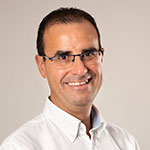 Luis Miguel Pedrero Esteban
Profesor de Creatividad Radiofónica
Radiophonic Creativity
Doctor en Comunicación Audiovisual y Publicidad por la Universidad Autónoma de Barcelona. Profesor acreditado por ANECA. Licenciado en Ciencias de la Información por la Universidad Pontificia de Salamanca. Investigador principal en la Facultad de Comunicación y Artes de la Universidad Nebrija. Autor de La radio musical en España: historia y análisis. Coautor de La industria audiovisual y publicitaria en Castilla y León (con A. Badillo y M. Fuertes) y La TV y los niños (con J. J. Muñoz). Especialista en storytelling y nuevas narrativas transmedia.
Luis Miguel Pedrero Esteban
Profesor de Creatividad Radiofónica
Radiophonic Creativity
Doctor en Comunicación Audiovisual y Publicidad por la Universidad Autónoma de Barcelona. Profesor acreditado por ANECA. Licenciado en Ciencias de la Información por la Universidad Pontificia de Salamanca. Investigador principal en la Facultad de Comunicación y Artes de la Universidad Nebrija. Autor de La radio musical en España: historia y análisis. Coautor de La industria audiovisual y publicitaria en Castilla y León (con A. Badillo y M. Fuertes) y La TV y los niños (con J. J. Muñoz). Especialista en storytelling y nuevas narrativas transmedia.
 Alejandro Priego Diaz
Profesor de Postproducción
Postproduction
Licenciado en Comunicación Audiovisual por la Universidad Rey Juan Carlos I. Profesor colaborador en la Facultad de Ciencias de la Información de la Universidad Complutense. En la actualidad, su trabajo profesional está centrado en la realización, edición y postproducción de vídeo para distintas productoras y canales de televisión (Plural Entertainment España, Bainet Media, Zebra Producciones, Globomedia, Mediapro, Trímboli, SCM-Medialab, Antena 3, La Sexta, Canal +, Telemadrid, TVE, Canal Extremadura, Aragon TV, EsMadridTV y Telecinco), en programas como Alaska y Mario, Los documentos de ‘La catedral del mar’, Generación Nini, Dragolandia, Sex Mundi (Serie documental para El País y el canal Odisea), El Internado, Desafío Ben 10 (Boing), Gourmetmanía, 52 Minutos, Los Viernes al Show o Callejeros.
Alejandro Priego Diaz
Profesor de Postproducción
Postproduction
Licenciado en Comunicación Audiovisual por la Universidad Rey Juan Carlos I. Profesor colaborador en la Facultad de Ciencias de la Información de la Universidad Complutense. En la actualidad, su trabajo profesional está centrado en la realización, edición y postproducción de vídeo para distintas productoras y canales de televisión (Plural Entertainment España, Bainet Media, Zebra Producciones, Globomedia, Mediapro, Trímboli, SCM-Medialab, Antena 3, La Sexta, Canal +, Telemadrid, TVE, Canal Extremadura, Aragon TV, EsMadridTV y Telecinco), en programas como Alaska y Mario, Los documentos de ‘La catedral del mar’, Generación Nini, Dragolandia, Sex Mundi (Serie documental para El País y el canal Odisea), El Internado, Desafío Ben 10 (Boing), Gourmetmanía, 52 Minutos, Los Viernes al Show o Callejeros.
 Maria del Mar Ramos Rodríguez
Coordinadora de prácticas de la FCA
FCA Internship Coordinator
Doctora en Bellas Artes por la Universidad Complutense de Madrid. Licenciada en Ciencias de la Imagen y Sonido por la misma universidad. Su práctica profesional se ha desarrollado en el mundo de la fotografía, la producción audiovisual y el diseño gráfico y editorial. Destaca su experiencia laboral en el mundo de la publicidad cinematográfica, en estudios de diseño y en la productora cinematográfica CineCompany, así como en las empresas de comunicación editorial Grupo Zeta y Vocento. En la Universidad de Nebrija imparte docencia desde 1998 en programas de grado y postgrado en las áreas de Comunicación Audiovisual, Periodismo y Publicidad al tiempo que lo compagina con proyectos gráficos y audiovisuales para empresas e instituciones. Desde el año 2022 es la coordinadora académica de Prácticas de la Facultad de Comunicación y Artes.
Maria del Mar Ramos Rodríguez
Coordinadora de prácticas de la FCA
FCA Internship Coordinator
Doctora en Bellas Artes por la Universidad Complutense de Madrid. Licenciada en Ciencias de la Imagen y Sonido por la misma universidad. Su práctica profesional se ha desarrollado en el mundo de la fotografía, la producción audiovisual y el diseño gráfico y editorial. Destaca su experiencia laboral en el mundo de la publicidad cinematográfica, en estudios de diseño y en la productora cinematográfica CineCompany, así como en las empresas de comunicación editorial Grupo Zeta y Vocento. En la Universidad de Nebrija imparte docencia desde 1998 en programas de grado y postgrado en las áreas de Comunicación Audiovisual, Periodismo y Publicidad al tiempo que lo compagina con proyectos gráficos y audiovisuales para empresas e instituciones. Desde el año 2022 es la coordinadora académica de Prácticas de la Facultad de Comunicación y Artes.
 Diego Rayón Rico
Profesor de La empresa y su entorno
The company and its environment
Licenciado en Derecho por la Universidad de Oviedo, Máster en Digital Business Management por EAE Business School y Master en Licenciado en Derecho por la Universidad de Oviedo, Executive MBA y Máster en Digital Business Management por EAE Business School y Master en Dirección de Marketing y Comercial por ESIC. Durante su carrera profesional, siempre dentro del área del marketing, comunicación y desarrollo de negocio, ha ocupado puestos de dirección en compañías de diferentes sectores como Recoletos Grupo de Comunicación, donde fue Director de Marketing del Área de Información Económica, Unidad Editorial, donde fue Head of Marketing del Area de Revistas o Sony Pictures Home Entertaiment, donde fue Head of Marketing. Tras su paso por 20Th Century Fox HE como Director de Marketing, actualmente es Socio y ocupa el cargo de Chief Commercial y Marketing Officer en Biddeo, compañía tecnológica del sector de la publicidad digital. Es socio fundador de Cuadrosdeasturias.com y de We are Speed Brand. Además, imparte docencia en otras instituciones académicas como EUDE o The Valley Business School
Diego Rayón Rico
Profesor de La empresa y su entorno
The company and its environment
Licenciado en Derecho por la Universidad de Oviedo, Máster en Digital Business Management por EAE Business School y Master en Licenciado en Derecho por la Universidad de Oviedo, Executive MBA y Máster en Digital Business Management por EAE Business School y Master en Dirección de Marketing y Comercial por ESIC. Durante su carrera profesional, siempre dentro del área del marketing, comunicación y desarrollo de negocio, ha ocupado puestos de dirección en compañías de diferentes sectores como Recoletos Grupo de Comunicación, donde fue Director de Marketing del Área de Información Económica, Unidad Editorial, donde fue Head of Marketing del Area de Revistas o Sony Pictures Home Entertaiment, donde fue Head of Marketing. Tras su paso por 20Th Century Fox HE como Director de Marketing, actualmente es Socio y ocupa el cargo de Chief Commercial y Marketing Officer en Biddeo, compañía tecnológica del sector de la publicidad digital. Es socio fundador de Cuadrosdeasturias.com y de We are Speed Brand. Además, imparte docencia en otras instituciones académicas como EUDE o The Valley Business School
 Juana Rubio Romero
Profesora de Teoría de la Comunicación
Communication Theory
Licenciada en Psicología. Doctora en Filosofía. Profesora Doctora Acreditada. Profesora e investigadora en la Facultad de Comunicación y Artes desde 1996. Su especialización son los Métodos de Investigación y la Psicología aplicados a la comunicación y al consumo. Experiencia profesional en investigación social y de mercado. Ha ejercido en diversos puestos de responsabilidad como investigadora cualitativista para Institutos de Investigación, Agencias de Publicidad y clientes directos. Ha dirigido durante cinco años el Curso de Investigación en Marketing, que organiza AEDEMO. Ha participado en numerosos congresos nacionales e internaciones, como ponente y formando parte del comité organizador. Sus publicaciones más relevantes son documentos técnicos de investigación social.
Juana Rubio Romero
Profesora de Teoría de la Comunicación
Communication Theory
Licenciada en Psicología. Doctora en Filosofía. Profesora Doctora Acreditada. Profesora e investigadora en la Facultad de Comunicación y Artes desde 1996. Su especialización son los Métodos de Investigación y la Psicología aplicados a la comunicación y al consumo. Experiencia profesional en investigación social y de mercado. Ha ejercido en diversos puestos de responsabilidad como investigadora cualitativista para Institutos de Investigación, Agencias de Publicidad y clientes directos. Ha dirigido durante cinco años el Curso de Investigación en Marketing, que organiza AEDEMO. Ha participado en numerosos congresos nacionales e internaciones, como ponente y formando parte del comité organizador. Sus publicaciones más relevantes son documentos técnicos de investigación social.
 Pedro Juan Sánchez Bermejo
Profesor de Laboratorio de animación digital y 3D
Professor of Digital and 3D Animation Laboratory
Doctor en Escultura por la Universidad Complutense de Madrid y licenciado en Bellas Artes con la especialidad en Diseño por la misma universidad.
Especialista en producción audiovisual con Autodesk Maya, su experiencia profesional se ha desarrollado como fotógrafo profesional y diseñador gráfico. También ha sido coordinador, diseñador editorial y Director de Arte en varias empresas de Diseño, desarrollando líneas de diseño y guías de estilo. Ha desempeñado funciones de Editor ejecutivo multimedia en el Grupo Santillana de educación, Jefe de Producción Multimedia en Oxford Universit y Presso Repsol-YPF.
Ha sido profesor de diferentes disciplinas en diferentes centros de formación y universidades. Actualmente compagina su labor docente con su trabajo como freelance de Diseño,3D y multimedia, gestión y producción de proyectos digitales, escultor y animador digital.
Pedro Juan Sánchez Bermejo
Profesor de Laboratorio de animación digital y 3D
Professor of Digital and 3D Animation Laboratory
Doctor en Escultura por la Universidad Complutense de Madrid y licenciado en Bellas Artes con la especialidad en Diseño por la misma universidad.
Especialista en producción audiovisual con Autodesk Maya, su experiencia profesional se ha desarrollado como fotógrafo profesional y diseñador gráfico. También ha sido coordinador, diseñador editorial y Director de Arte en varias empresas de Diseño, desarrollando líneas de diseño y guías de estilo. Ha desempeñado funciones de Editor ejecutivo multimedia en el Grupo Santillana de educación, Jefe de Producción Multimedia en Oxford Universit y Presso Repsol-YPF.
Ha sido profesor de diferentes disciplinas en diferentes centros de formación y universidades. Actualmente compagina su labor docente con su trabajo como freelance de Diseño,3D y multimedia, gestión y producción de proyectos digitales, escultor y animador digital.
 Saida Santana Mahmut
Profesora de Dirección de actores
Direction of actors
Doctora por la Universidad Rey Juan Carlos. Profesora acreditada por ANECA. Licenciada en Ciencias de la Información por la Universidad Complutense de Madrid, Máster en Artes Escénicas por la URJC, Máster en coaching personal y ejecutivo por la Universidad Camilo José Cela. Como actriz se formó con el catedrático de la RESAD Jorge Eines y en la Universidad de Roma Terza (DAMS), entre otras escuelas y maestros. Ha trabajado tanto en televisión como en cine y teatro, como actriz, guionista, periodista, creadora escénica y coach. Como directora, dramaturga y actriz ha representado en los últimos meses, en Miami, dos piezas de medio formato.
Saida Santana Mahmut
Profesora de Dirección de actores
Direction of actors
Doctora por la Universidad Rey Juan Carlos. Profesora acreditada por ANECA. Licenciada en Ciencias de la Información por la Universidad Complutense de Madrid, Máster en Artes Escénicas por la URJC, Máster en coaching personal y ejecutivo por la Universidad Camilo José Cela. Como actriz se formó con el catedrático de la RESAD Jorge Eines y en la Universidad de Roma Terza (DAMS), entre otras escuelas y maestros. Ha trabajado tanto en televisión como en cine y teatro, como actriz, guionista, periodista, creadora escénica y coach. Como directora, dramaturga y actriz ha representado en los últimos meses, en Miami, dos piezas de medio formato.
 Diana Sánchez Serrano
Profesora de Creatividad Literaria
Literary Creativity Professor
Doctora Cum Laude en Publicidad y Comunicación Aplicada por la UCM, donde también cursó el Máster en Escritura Creativa y completó su licenciatura en Publicidad y RR.PP. Especialista en redacción publicitaria y creatividad con más de una década de experiencia en agencias nacionales e internacionales ha compaginado la actividad profesional con la docencia en grado y postgrado. Directora del Grado en Publicidad y Relaciones públicas. Entre sus principales líneas de investigación destacan los estudios sobre creatividad social, la culturización social de las marcas o la idoneidad de estrategias en culturas contemporáneas. Y sus últimas publicaciones ponen el foco en la relación de las marcas con el consumidor:
Diana Sánchez Serrano
Profesora de Creatividad Literaria
Literary Creativity Professor
Doctora Cum Laude en Publicidad y Comunicación Aplicada por la UCM, donde también cursó el Máster en Escritura Creativa y completó su licenciatura en Publicidad y RR.PP. Especialista en redacción publicitaria y creatividad con más de una década de experiencia en agencias nacionales e internacionales ha compaginado la actividad profesional con la docencia en grado y postgrado. Directora del Grado en Publicidad y Relaciones públicas. Entre sus principales líneas de investigación destacan los estudios sobre creatividad social, la culturización social de las marcas o la idoneidad de estrategias en culturas contemporáneas. Y sus últimas publicaciones ponen el foco en la relación de las marcas con el consumidor:- “La publicidad como fuente socializadora en materia familiar: El caso IKEA (1996-2012)”. Revista Mediaciones Sociales, vol 17 (2018)
- Convertirse en Love Brand, desde la culturización social. El caso IKEA (2010-2020)
- La importancia en la estrategia de contenidos y distribución en la eficacia del branded content. El caso Aprendemos Juntos, de BBVA
 Celia Sancho Belinchón
Profesora de Historia de los medios de comunicación
Professor of Media History
Celia Sancho Belinchón es doctora en Comunicación Audiovisual, Publicidad y Relaciones Públicas. Está especializada en comunicación digital, estrategia de comunicación política y comunicación corporativa digital, siendo estas las áreas a las que ha dedicado ocho años de su carrera profesional. Durante los últimos años ha impartido asignaturas relativas a la gestión de contenidos digitales y la comunicación digital en los grados de Periodismo y Comunicación Corporativa. Actualmente es profesora en la facultad de Comunicación y Artes de la Universidad Nebrija y directora del Master de Periodismo Digital y de Datos de esta misma universidad. Cuenta en su currículum con varias publicaciones científicas relativas al estudio de la estrategia digital de los medios de comunicación o el análisis de las plataformas digitales utilizadas en el cine.
Celia Sancho Belinchón
Profesora de Historia de los medios de comunicación
Professor of Media History
Celia Sancho Belinchón es doctora en Comunicación Audiovisual, Publicidad y Relaciones Públicas. Está especializada en comunicación digital, estrategia de comunicación política y comunicación corporativa digital, siendo estas las áreas a las que ha dedicado ocho años de su carrera profesional. Durante los últimos años ha impartido asignaturas relativas a la gestión de contenidos digitales y la comunicación digital en los grados de Periodismo y Comunicación Corporativa. Actualmente es profesora en la facultad de Comunicación y Artes de la Universidad Nebrija y directora del Master de Periodismo Digital y de Datos de esta misma universidad. Cuenta en su currículum con varias publicaciones científicas relativas al estudio de la estrategia digital de los medios de comunicación o el análisis de las plataformas digitales utilizadas en el cine.
 Alejandro Sanz Ollero
Profesor de Diseño gráfico
Professor of Graphic Design
Arquitecto Superior por la ETSAM (Universidad Politécnica de Madrid).
Como docente, participa en el Master in Advanced Ecological Buildings del IAAC siendo profesor del módulo "Surprise! I'm a hybrid building". Asimismo, ha sido ponente en distintas conferencias en escuelas de arquitectura y diseño como la ETSAM, la Escuela de Interiores de la UPM o la Escuela de Arquitectura de Alicante.
A lo largo de su carrera, Alex Ollero ha sido redactor de Arquitectura Viva; ha trabajado como diseñador para Jakob+MacFarlane Architects en París; ha ideado y desarrollado los conceptos gráficos de la editorial A+T Architecture Publishers; ha sido consultor para distintas agencias de publicidad como Young & Rubicam; ha diseñado estrategias de shopper marketing junto a LabStore Madrid; ha desarrollado proyectos de diseño de retail y punto de venta para Blank Architects en Moscú; y ha trabajado los últimos 3 años como director de arte en la consultora de diseño estratégico 3g Smart Group.
Alejandro Sanz Ollero
Profesor de Diseño gráfico
Professor of Graphic Design
Arquitecto Superior por la ETSAM (Universidad Politécnica de Madrid).
Como docente, participa en el Master in Advanced Ecological Buildings del IAAC siendo profesor del módulo "Surprise! I'm a hybrid building". Asimismo, ha sido ponente en distintas conferencias en escuelas de arquitectura y diseño como la ETSAM, la Escuela de Interiores de la UPM o la Escuela de Arquitectura de Alicante.
A lo largo de su carrera, Alex Ollero ha sido redactor de Arquitectura Viva; ha trabajado como diseñador para Jakob+MacFarlane Architects en París; ha ideado y desarrollado los conceptos gráficos de la editorial A+T Architecture Publishers; ha sido consultor para distintas agencias de publicidad como Young & Rubicam; ha diseñado estrategias de shopper marketing junto a LabStore Madrid; ha desarrollado proyectos de diseño de retail y punto de venta para Blank Architects en Moscú; y ha trabajado los últimos 3 años como director de arte en la consultora de diseño estratégico 3g Smart Group.
 Andy Tavárez Pérez
Profesor de Tecnología Audiovisual / Series de ficción y Series de ficción
Audiovisual Technology / Fiction series and Fiction series
Graduado en Comunicación Audiovisual por la Universidad Nebrija. Coordinador académico de Nebrija MediaLab, plataforma de medios de comunicación de la Facultad. Cortometrajista y guionista, creador de contenidos multimedia. Creador y co-director del medio de comunicación digital Previously, sobre series de ficción, cine y televisión del que actualmente es codirector. Ha colaborado con otros medios de comunicación como radio Happy FM del periódico El Mundo, la Muestra de cine Línea Imaginaria y jurado de cine en varias ediciones del festival de Nuevos Realizadores de Madrid.
Andy Tavárez Pérez
Profesor de Tecnología Audiovisual / Series de ficción y Series de ficción
Audiovisual Technology / Fiction series and Fiction series
Graduado en Comunicación Audiovisual por la Universidad Nebrija. Coordinador académico de Nebrija MediaLab, plataforma de medios de comunicación de la Facultad. Cortometrajista y guionista, creador de contenidos multimedia. Creador y co-director del medio de comunicación digital Previously, sobre series de ficción, cine y televisión del que actualmente es codirector. Ha colaborado con otros medios de comunicación como radio Happy FM del periódico El Mundo, la Muestra de cine Línea Imaginaria y jurado de cine en varias ediciones del festival de Nuevos Realizadores de Madrid.
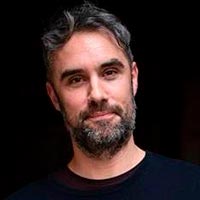 Sergio Testón Udaondo
Profesor de Postproducción de sonido
Sound Postproduction
Licenciado en Geografía por la Universidad Complutense de Madrid, técnico de sonido especializado en Postproducción de Audio para Cine y TV. Con una trayectoria de más de 10 años de experiencia, realizando trabajos de sonido como mezclador, ayudante de mezclas, montador. Ha trabajado en películas como Ozzy (Alberto Rodríguez, nominada Goya al mejor sonido 2017), Carmina y Amen (Paco León), El olivo (Icíar Bollaín), Vivir es fácil con los ojos cerrados (David Trueba), La isla mínima y Grupo 7 (Alberto Rodríguez), Caníbal (Manuel Martín Cuenca), 8 Apellidos Vascos y 8 Apellidos Catalanes (Emilio Martínez Lázaro), Villaviciosa de al lado y Perdiendo el norte (Nacho G. Velilla), No habrá paz para los malvados (Enrique Urbizu, Goya mejor sonido 2012).
En el sector de la TV ha sonorización diferentes documentales, cortometrajes, series de TV como Fenómenos, El ministerio del tiempo o Gigantes (serie de Enrique Urbizu y Jorge Dorado, actualmente en postproducción).
Sergio Testón Udaondo
Profesor de Postproducción de sonido
Sound Postproduction
Licenciado en Geografía por la Universidad Complutense de Madrid, técnico de sonido especializado en Postproducción de Audio para Cine y TV. Con una trayectoria de más de 10 años de experiencia, realizando trabajos de sonido como mezclador, ayudante de mezclas, montador. Ha trabajado en películas como Ozzy (Alberto Rodríguez, nominada Goya al mejor sonido 2017), Carmina y Amen (Paco León), El olivo (Icíar Bollaín), Vivir es fácil con los ojos cerrados (David Trueba), La isla mínima y Grupo 7 (Alberto Rodríguez), Caníbal (Manuel Martín Cuenca), 8 Apellidos Vascos y 8 Apellidos Catalanes (Emilio Martínez Lázaro), Villaviciosa de al lado y Perdiendo el norte (Nacho G. Velilla), No habrá paz para los malvados (Enrique Urbizu, Goya mejor sonido 2012).
En el sector de la TV ha sonorización diferentes documentales, cortometrajes, series de TV como Fenómenos, El ministerio del tiempo o Gigantes (serie de Enrique Urbizu y Jorge Dorado, actualmente en postproducción).
 Fernando Toledano Cuervas-Mons
Profesor de Creatividad publicitaria
Advertising Creativity
Doctor en Ciencias de la información por la Universidad Complutense de Madrid. Profesor acreditado por ANECA. Master en Publicidad por ICADE (Universidad Comillas). Licenciado en Ciencias de la Información por la UCM, especialidad en Comunicación audiovisual. Ha trabajado en Gardoqui-Gold; Publicis y RdA Comunicación. Profesor en el Master Universitario en Dirección de Publicidad Integrada TBWA. Ha sido docente en el Curso de Creatividad Publicitaria y de la Comunicación del IED (Istituto Europeo di Design). Pertenece al Comité Ejecutivo del Capítulo Académico de la IAA (International Advertising Association). Actualmente es Coordinador académico de Grado en Publicidad y RR.PP., del Grado en Marketing y Comunicación Comercial y profesor permanente de la Facultad de Comunicación y Artes.
Fernando Toledano Cuervas-Mons
Profesor de Creatividad publicitaria
Advertising Creativity
Doctor en Ciencias de la información por la Universidad Complutense de Madrid. Profesor acreditado por ANECA. Master en Publicidad por ICADE (Universidad Comillas). Licenciado en Ciencias de la Información por la UCM, especialidad en Comunicación audiovisual. Ha trabajado en Gardoqui-Gold; Publicis y RdA Comunicación. Profesor en el Master Universitario en Dirección de Publicidad Integrada TBWA. Ha sido docente en el Curso de Creatividad Publicitaria y de la Comunicación del IED (Istituto Europeo di Design). Pertenece al Comité Ejecutivo del Capítulo Académico de la IAA (International Advertising Association). Actualmente es Coordinador académico de Grado en Publicidad y RR.PP., del Grado en Marketing y Comunicación Comercial y profesor permanente de la Facultad de Comunicación y Artes.
 Cesar Vidal Gi
Profesor de Fundamentos del Guion I
Professor of Screenplay Fundamentals I
Licenciado en ciencias de la Información Rama Ciencias de la Imagen.
Mi trayectoria profesional se centra desde el principio en la creación de guiones y, la mayor parte, en la ficción televisiva. He colaborado en productoras como Videomedia, Globomedia, Filmax, etc, para las que desarrollé todo tipo de formatos. Escribí mis primeros guiones en Los ladrones van a la oficina y Colegio Mayor, pero fue en Globomedia donde fui testigo en primera persona de la eclosión de la industria de las series en España. Participé en la histórica Médico de familia. Fui coordinador de guiones en Menudo es mi padre. Cocreé, escribí, dirigí treinta episodios y fui productor ejecutivo de Compañeros. Cocreé, escribí y fui coproductor ejecutivo de Mis adorables vecinos. Escribí las series de ámbito policial Cuenta Atrás, Punta Escarlata y Sé quién eres. En cine he escrito varios guiones, entre los que destaco La mano de Dios, biopic sobre Diego Maradona dirigido en 2007 por Marco Rissi. He diseñado otro tipo de formatos, como el inclasificable Mzungu, operación Congo, donde se mezcla la realidad y la ficción, programas de cámara oculta, concursos, etc. Actualmente desarrollo mis propios proyectos de ficción, por lo que estoy en contacto permanente con la industria.
Cesar Vidal Gi
Profesor de Fundamentos del Guion I
Professor of Screenplay Fundamentals I
Licenciado en ciencias de la Información Rama Ciencias de la Imagen.
Mi trayectoria profesional se centra desde el principio en la creación de guiones y, la mayor parte, en la ficción televisiva. He colaborado en productoras como Videomedia, Globomedia, Filmax, etc, para las que desarrollé todo tipo de formatos. Escribí mis primeros guiones en Los ladrones van a la oficina y Colegio Mayor, pero fue en Globomedia donde fui testigo en primera persona de la eclosión de la industria de las series en España. Participé en la histórica Médico de familia. Fui coordinador de guiones en Menudo es mi padre. Cocreé, escribí, dirigí treinta episodios y fui productor ejecutivo de Compañeros. Cocreé, escribí y fui coproductor ejecutivo de Mis adorables vecinos. Escribí las series de ámbito policial Cuenta Atrás, Punta Escarlata y Sé quién eres. En cine he escrito varios guiones, entre los que destaco La mano de Dios, biopic sobre Diego Maradona dirigido en 2007 por Marco Rissi. He diseñado otro tipo de formatos, como el inclasificable Mzungu, operación Congo, donde se mezcla la realidad y la ficción, programas de cámara oculta, concursos, etc. Actualmente desarrollo mis propios proyectos de ficción, por lo que estoy en contacto permanente con la industria.
More Academic Information
Official Degree:Bachelor's Degree in Audiovisual Communications
Students with creative interests and an openness to culture and the arts - film, literature, music, theatre, art, comics, urban culture, video games, digital world and shows in general - with a great capacity for teamwork, an open and pluralistic mentality, a dynamic spirit and a strong communicative character. They must be eager to learn and work, to experiment with creation, to be full of curiosity and hungry for culture, to have a great capacity for teamwork, and to be communicative and free of prejudices.
240 ECTS credits
Full time: Minimum of 45 ECTS credits and maximum of 90 ECTS credits.
Part time: Minimum of 12 ECTS credits and maximum of 44 ECTS credits.
Center responsible:School of Communication and Arts
Branch of knowledge:Social and Legal Sciences
Available places: 80
Type of Education: Classroom Attendance
Academic year in which it was implemented: 2014-2015
Languages: Spanish / English
University Services: [+info]
Competences
Specific Competences- Understand the basic concepts of Literature, Art, Business, Communication, Modern Language and Law that interact with the activity of communication.
- Understand and apply the fundamentals of audiovisual language in the production and analysis of audiovisual products.
- Understand the aesthetic and technical foundations of photographic composition, combining a theoretical and practical approach.
- Be aware of the history and development of cinema through its aesthetic and industrial proposals, as well as its social and cultural relevance.
- Understand the modern world through contemporary art, with special reference to communicative and audiovisual messages.
- Understand the fundamental principles of construction of a fiction script according to its different phases (synopsis, playlist, treatment...).
- Build a fictional narrative based on image and sound.
- Plan and manage human, budgetary and technical resources in the various phases of the production of an audiovisual project.
- Understand the aesthetic and technical foundations of editing, combining a theoretical and practical approach.
- Be conversant with the technological tools to organise sound and visual materials according to a narrative structure.
- Design and construct the aesthetic and technical presentation of mise en scène through natural or artificial light sources, taking into account the creative characteristics proposed by the audiovisual project manager.
- Plan and manage technical and human resources in single and multi-camera productions for television, and techniques and processes of creation and directing at the various stages of television production.
- Understand and master the technological elements of audiovisuals, to understand their nature and technical possibilities.
- Master the use of professional recording equipment.
- Apply techniques and procedures of visual composition based on knowledge of classical laws and the aesthetic and cultural movements of the history of the visual arts.
- Analyse audiovisual works according to existing methodologies and identify aesthetic, cultural and socio-political conditioning factors present in the story.
- Understand the principles of film direction, paying special attention to mise en scène and coordinating human and technical resources.
- Design and construct the aesthetic and technical presentation of mise en scène, taking into account the creative characteristics proposed by the audiovisual project manager.
- Apply knowledge acquired while in training to the practical challenges of professional life.
- Present and defend an project of one's own related to audiovisual communication.
- Demonstrate a suitable command of spoken and written English in the modern language module and subjects taught in English.
- Show good command of spoken and written Spanish.
- Apply theoretical knowledge to an understanding of reality and to solving specific problems in the Social Sciences, especially in the realm of Communications.
- Compile, discriminate and categorise information from bibliographical and documentary sources.
- Apply critical reasoning based on analysis and synthesis.
- Apply ingenuity and creativity, especially in communicative processes.
- Acquire an ethical commitment to the job, with an awareness of media law, especially as it applies to the professional practice of audiovisual communication.
- Show social sensibility when doing professional and/or academic work, abiding by Spanish and European law, codes of good practice, self-regulation standards, gender equality, the special needs of people with disabilities, child protection and, in general, the principles contained in the Spanish Constitution and the values inherent in the culture of peace.
- Show the ability to work in a team and develop interpersonal relationships while creating audiovisual projects.
- Show the ability to lead and manage projects effectively, while abiding by the principles of social responsibility.
- Apply innovative and dynamic techniques to managing work, projects and teams.
- Develop and demonstrate initiative and an entrepreneurial spirit.
- Solve problems as they emerge when constructing audiovisual messages and implementing communication and creative processes.
- Develop the necessary personal attitudes and skills in the audiovisual communication and business worlds to join the job market and enhance one's maturity and adaptability with a view to subsequent learning life stages.
- Correctly handle new communication technologies.
- Apply the skills acquired in the course of the training programme.
Calendar and schedules
Academic Calendar
Schedules
Admission
Access Ways
The access routes to the Bachelor's Degree in Audiovisual Communication are described below. In addition, Nebrija University will publish on its website the places available for the first year of the Bachelor's Degree in Audiovisual Communication.
1
Students who have a baccalaureate degree and have passed the University Access Tests may apply for admission, in accordance with the provisions of Royal Decree 1892/2008, of November 14, which regulates the access conditions to official university teachings of Bachelor's Degrees.
2
Also, and in accordance with the provisions of RD 412/2014, the following students may apply for admission to the university:
- a) Graduates in European Baccalaureate or International Baccalaureate.
- b) Students who have degrees, diplomas or Baccalaureate studies from educational systems of Member States of the European Union, or other States with which international agreements applicable in this regard have been signed, on a reciprocal basis.
- c) Students who have degrees, diplomas or studies homologated to the Baccalaureate degree of the Spanish Educational System, obtained or carried out in educational systems of States that are not members of the European Union with which no international agreements have been signed in reciprocity for the recognition of the Baccalaureate degree, notwithstanding the provisions of article 4 of RD 412/2014.
- d) Students who have official degree of Senior Technician in Vocational Formation, of Senior Technician in Plastic Arts and Design, or of Senior Sports Technician belonging to the Spanish Educational System, or degrees, diplomas or studies declared equivalent or homologated to said degrees, without prejudice of the provisions in article 4 of RD 412/2014.
- e) Students who have degrees, diplomas or studies, other than those equivalent to Baccalaureate degrees, Senior Technician in Vocational Training, Senior Technician in Plastic Arts and Design, or Senior Sports Technician of the Spanish Educational System, obtained or carried out in a member State of the European Union, or in other States with which international agreements have been signed that are applicable in this regard, on a reciprocal basis, when said students meet the academic requirements demanded in said Member State to access its Universities.
- f) People who have passed the university entrance exam for people over 25 years old.
- g) People who have passed the access test for official Bachelor's degree studies for people over 40 years old, through accreditation of work or professional experience. The procedures for admission through this route are reflected in the “POA_9 Access procedure over people over 40 years old”
- h) People who have passed the university entrance exam for people over 45 years old.
- i) Students who have an official Bachelor's, Master's or equivalent degree.
- j) Students who have an official Associate's Degree, or a degree as Technical Architect, Technical Engineer, Undergraduate, Architect, Engineer, corresponding to the previous ordinance of university education, or an equivalent degree.
- k) Students who have taken partial foreign or Spanish university studies, or who have finished foreign university studies but have not obtained their homologation in Spain and wish to continue studies at a Spanish university. In this case, it will be an indispensable requirement that Nebrija University have recognized at least 30 ECTS credits.
- l) Students who were able to access the university according to regulations of the Spanish Educational System prior to Organic Law 8/2013, of December 9.
- m) According to Order ECD/1941/2016, of December 22, in its sole transitory provision, it is not necessary to pass the Baccalaureate assessment test in order access the University in the following cases:
- a) Students who join a baccalaureate course in the educational system defined by Organic Law 8/2013, of December 9, with Baccalaureate subjects that were not passed from the curriculum prior to its implementation, and who study these subjects according to the curriculum of the prior educational system.
- b) Students who obtained the baccalaureate degree in the 2015-2016 academic year and did not access the University at the end of said year.
- In both cases, and when these students do not take the test, the grade to access official undergraduate university studies will be the final grade obtained in Baccalaureate.
In the case of students with special educational needs derived from disabilities, the need for possible curricular adaptations, itineraries or alternative studies will be assessed.
Admission
At Nebrija University, the admission procedures established by university legislation will be carried out with particular reference to the guiding principles of accessing Spanish universities: equality, merit, ability, universal accessibility and adjustment to the criteria of the European Higher Education Area.
How to and deadlines for submitting admission applications
In order to apply for admission to any official university Bachelor's degree, it will be necessary to complete the corresponding admission application through the University website, or request it at any of the university campuses within the deadlines established by the Department of University Development.
Documentation necessary for admission to Bachelor's degree studies
- a) Students with University Entrance Exams (from Baccalaureate and university entrance exams for people over 25yo): Those who have attended the University Entrance Exams must bring:
- Copy of DNI or accrediting document.
- Report with the grades of the University Entrance Exams.
- Personal academic record with the grades obtained in baccalaureate.
- File Transfer Fees sealed by the University Secretary where the University Entrance Exam (Selectividad) was carried out.
- b) Students who have a degree, diploma or studies equivalent to the Baccalaureate degree in educational systems from Member States of the European Union or from other States with which applicable international agreements have been signed, on a reciprocal basis. Graduates of European Baccalaureate or International Baccalaureate.
- Copy of Passport or accrediting document.
- Credentials for compliance with the requirements issued by the UNED or by the specified entity.
- Report of grades obtained in the University Entrance Exams, if applicable.
- Accreditation of a B2 level in the Spanish language in the case of students whose nationality does not correspond to Spanish-speaking countries.
- c) Students from Advanced Vocational Training, Second Degree Vocational Training: These students must provide the following:
- Copy of the DNI or accrediting document.
- Personal academic record with the grades obtained and the final numerical grade.
- Diploma or the receipt of having paid the issuing fee of the diploma.
- In their case, document stating the result of the Specific Phase of the University Entrance Exams.
- d) University Graduates:
- Copy of the DNI or accrediting document.
- Academic record with the grades of each of the subjects taken and the final average grade.
- Diploma or receipt of having paid the issuing fee for the diploma.
- Copy of Passport, DNI or accrediting document.
- Homologation of the university degree.
- Equivalences of average grades of studies taken in foreign centers.
- Accreditation of a B2 level in the Spanish language in the case of students whose nationality does not correspond to Spanish-speaking countries.
- e) Students from previous educational arrangements who have not attended the general phase of University Entrance Exams, regulated in Royal Decree 1892/2008, of November 14:
- Students from COU (college preparation courses) prior to the 1974-75 academic year, and students who have passed the Higher Baccalaureate with a state exam: copy of DNI, grade book and the grade card of the specific phase of the University Entrance Exams, if applicable.
- Students who have passed the Higher Baccalaureate, PREU and the Maturity Test: copy of DNI, grade book, Maturity Test card and the grade card of the specific phase of the University Entrance Tests, in their case.
- f) Students with partial recognition of foreign studies:
These students must submit the following documentation, officially translated and legalized, if applicable:- Recognition request form.
- Copy of Passport or accrediting document.
- Academic record accrediting the level and type of studies carried out, issued by the corresponding official Center, stating, at least, the following data: subjects taken, the credits or hourly load of each, grade and table or scale of grades.
- Curriculum or table of subjects of the degree to which the subjects to be recognized belong, with express indication of the duration of those studies in academic years and the subjects that comprise it, and with the original seal of the Center of origin, or failing that, the documentation requested in the credit recognition procedure.
- Subject programs, with details of the content and scope (hours and credits) with which they have been taken, and with the original stamp of the Center of origin or, failing that, the documentation requested in the credit recognition procedure.
- Accreditation of a B2 level in the Spanish language in the case of students whose nationality does not correspond to a Spanish-speaking country.
- Equivalences of average grades of studies carried out in foreign centers.
- i) Students requesting admission due to change of university and/or studies. Students from other universities must submit the following documentation:
- Copy of the DNI or accrediting document
- Copies sealed by the university of origin of the official content and competence programs, or teaching guides, of the different subjects passed or, failing that, the documentation requested in the credit recognition procedure
- Personal academic record of university studies started with an average grade of 0-10, based on the provisions of Royal Decree 1125/2003 (BOE 09/18/2003)..
- Photocopy of the BOE where the degree's curriculum you are studying is published.
- j) Access to the University for people over 45 yo.
- Copia del DNI o documento acreditativo
- Certificado que acredite la superación de la Prueba de Acceso para Mayores de 45 años (prueba realizada en la Universidad Antonio de Nebrija)
- k) Acceso a la Universidad mayores de 40 años.
- Copy of the DNI or accrediting document
- Positive report after the assessment at Nebrija University of all the requirements established in Art. 16 RD 412/2014.
Only those candidates who have submitted the required documentation within the deadlines established by the Admissions Department will be processed. In addition, the student will be asked for all the additional information that was deemed appropriate in order to know the candidate's suitability for the Bachelor's Degree.
For the purposes of pre-admission and admission, the evaluation of the candidate will be made using 0 to 10 points, taking into account the following criteria and percentages:
Academic record of the student's route of origin 60%
Multiple-choice psychotechnical test Evaluation 5%
This test consists of a personality assessment test that explores the emotional, intellectual, social, and norms and values areas of each candidate for a Bachelor's Degree in Journalism at Nebrija University
English level test Evaluation 5%
In addition to the competences established in the Bachelor's Degree in Audiovisual Communication, we have included another related to the adequate knowledge of the English language, both oral and written. The English level tests consist of a written exam with multiple choice questions, oral and written comprehension. They are taken in person or online, and are held in computer rooms on each campus, with professors from the Institute of Modern Languages. Depending on the results of this test, the student will be positioned at the corresponding level.
It will not be necessary for the candidate to take the language positioning test if they provide a document proving their English level. The level accreditation will be validated through the official degrees established by the table of certificates accepted by ACLES. They are valid for one year. Students who take degrees in which subjects are taught in English must have accredited a B2 level in that language.
Specific test of knowledge about the Bachelor's Degree in Audiovisual Communication Evaluation 10%
It contains multiple choice questions and consists mainly of specific contents of some of the main areas of general knowledge (Communication and Journalism) that will be studied in the degree chosen by the candidate, in addition to other elements common to all degrees.
Personal interview Evaluation 20%
As a strategy to know the characteristics of the applicants, the academic department will try to determine if the candidate has sufficient motivation, training and knowledge, abilities, aptitudes, communication skills, extracurricular activities and future interests necessary to be admitted as a student of the Bachelor's Degree in Journalism at Nebrija University.
Employability
Carreer oportunities
The faculty of the Faculty of Communication and Arts is made up of professionals from all specializations. In teaching, the premise that what we learn, we learn by doing is applied.
The main objective is that students are prepared for the leap into the professional world. For this, the profession is integrated by incorporating professionals such as associate professors, endorsers of each program. The teaching method is inspired by the idea of learning by doing, which emphasizes classroom experience and academic extension activities.
The Degree in Audiovisual Communications has a collaboration agreement with some of the best companies and institutions in the sector, such as Atresmedia, Smedia, Agencia EFE or Mediaset España, where students can complete their professional internships and obtain In this way, a first work experience of maximum demand.
The Bachelor's Programme in Audiovisual Communication trains young professionals to become:
Internships
List of companies where the student can do internships
- MEDIASET ESPAÑA COMUNICACIÓN, S.A.
- 20 MINUTOS EDITORA, S.L.
- ANTENA 3 MULTIMEDIA, S.L.U.
- ATRESMEDIA CORPORACIÓN DE MEDIOS DE COMUNICACIÓN, S.A.
- AVISPA S.L
- BOOMERANG TV, S.A.
- CORPORACIÓ CATALANA DE MITJANS AUDIOVISUALS, SA
- CORPORACIÓN RTVE, S.A.
- DISPLAY CONNECTORS, S.L. (PÚBLICO.ES)
- DREAMLIGHT INTERNATIONAL PRODUCTIONS S.L
- EL TERRAT DE PRODUCCIONS S.L.U.
- SUPERSPORT TELEVISIÓN S.L.
- TBS SUPERSPORT UTE / REAL MADRID C.F.
- ESCUELA DE CINE UN PERRO ANDALUZ
- EUROPA PRESS DELEGACIONES, S.A.
- FILMAYER PRODUCCIONES AUDIOVISUALES S.L
- REAL FEDERACIÓN DE FÚTBOL DE MADRID
- SECUOYA CONTENIDOS S.L
Internships management procedures
Procedure of performance in the realization of external internships Management process of external internships and Professional Orientation Labor insertion survey report More informationEmployability recognized in the Rankings
The commitment of Nebrija University to the academic requirement, training in leading companies and institutions, innovation in multidisciplinary programs and international projection, places the University in the top positions of the most important rankings.
The International Ranking QS Stars awards Nebrija University the maximum score in the quality and satisfaction of students in teaching, employability of the graduates and the internationalization of the institution.
The national rankings also recognize Nebrija University as the first Spanish university in teaching and second in employability, highlighting its performance in research, knowledge transfer and internationalization.
The Bologna Declaration formalized the principles on which the European Higher Education Area should be based: quality, mobility, diversity, competitiveness and employment growth.
From this, Nebrija stands as an academic model of reference, educating students with excellent individual behavior, interaction with their environment and motivated by and for constant and continuous training. The Nebrija Institute of Professional Skills works every day to achieve the differentiation of our students through the development of attitudes and skills.
The main objective is for students to achieve the best of themselves through the development and empowerment of their personal skills and resources through personal self-knowledge.
In addition, some of the professional skills that are worked on within the three seminars are those related to interpersonal skills and active communication skills and negotiation, indispensable for our students to know how to transmit ideas, to argue them, to provide information and opinions in an adequate, clear and convincing way.
Within what will be their work performance, other aspects such as teamwork, conflict resolution and project management ability will be worked on.
In the third block, skills worked on are those aimed at increasing the student's employability. They will work with tools and techniques for job searching, and perform tasks that achieve in the student a greater use of their personal skills.
For all this we have currently active experts in selection of people, professionals dedicated to personal and professional training and professionals dedicated to the world of communication and the arts.
In this way, and in a complementary way to his/her specific training, we help the student create a differentiating pattern in the social and business environment in which he/she will be immersed when he/she finishes his/her studies.
International
After studying the curriculum map of Nebrija University's Bachelor's degrees, the Secretariat of Higher Education, Science, Technology and Innovation of Ecuador (SENESCYT) recognizes this Bachelor's degree through document number SENESCYT-SGES-SFA-2019-0722-O
The International Mobility Office of the Universidad Antonio de Nebrija monitors agreements with leading universities worldwide on an ongoing basis.
Students have the option of spending a year or a semester of study at another leading university in the European Union, North America, Latin America or Asia. This option will widen your view of the world, let you exchange ideas and experiences with students in other countries, enhance your language skills, and help you prepare to perform your profession to the highest standard anywhere in the world.
Communication and Arts students have the option of pursuing studies at the following foreign universities:
NOTE: The destination universities, offered by degree, may vary according to the International Mobility Program. For more information, students can consult the information online in the. International Mobility Program.
The information published here is for guidance only and may be subject to modification.
Your degree in Audiovisual Communication
Isabel Peña and Rodrigo Sorogoyen, Honor Award of the XX edition of the AdN Festival
The tandem of the year, the creators of the magnificent and award-winning work As bestas have received the Honor Award of the twentieth edition of the AdN Festival. The gala was held at the Callao Cinemas in Madrid, where our Audiovisual Communication Degree students were able to demonstrate their talent on the big screen.
Ver noticia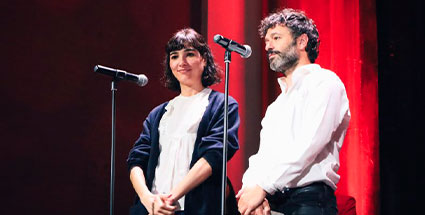
Two short films by Bachelor's students participate in the Guadalajara International Film Festival (Mexico)
The Guadalajara International Film Festival (FICG), one of the most relevant and sound cultural events in Latin America, included in its 38th edition the screening of two short films made by Nebrija University students. Gazpachuelo, by Chari Li (Audiovisual Communication), and Mutis, by Antía Goyene and Andrea Rozas (Performing Arts and Audiovisual Communication), were part of the official 2023 programming at the largest showcase for the dissemination, promotion and distribution of Mexican and Ibero-American cinema.
See article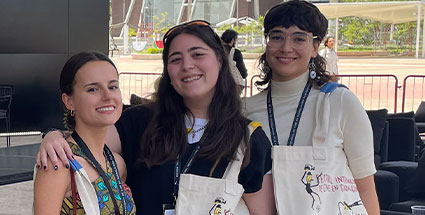
 Since last March, Nebrija University has been part of the new Madrid Audiovisual Cluster.
Since last March, Nebrija University has been part of the new Madrid Audiovisual Cluster. The deputy mayor of Madrid, Begoña Villacís, together with the delegate for the Economy, Innovation and Employment, Miguel Ángel Redondo, and accompanied by the delegate for Tourism, Culture and Sports, Andrea Levy, and the head of the Department of Tourism, Almudena Maíllo , have participated in the first meeting of the Audiovisual Cluster of Madrid, which has been constituted with the participation of 59 companies and entities in the signing of the founding act.
Since last March, Nebrija University has been part of the new Madrid Audiovisual Cluster
- Premiere of the feature film Relatos de Eleria: el viaje de Gawain
The students Jorge Tudanca and Ramón Caramés, from the 2nd year of the Degree in Audiovisual Communications, premiered their first feature film in January 2019 , 'Tales of Eleria: Gawain's journey', in the auditorium of the Nebrija University. The science-fiction film, inspired by the fantastic worlds of Tolkien, also had the help of another student from the same course, Alberto Pérez, in the script. - Feature film Smoking Club. 129 rules
Alberto Utrera, with a degree in Audiovisual Communication, premieres his first feature debut in the spring of 2017, the feature film Smoking Club. 129 standards. The film is produced by MOA Studio in collaboration with The Lobby, and stars Rodrigo Poison and Jimmy Castro, among others. - Short film Dinosaurs
Daniel Allué's short film Dinosaurios –winner of the AdN Best Short Film 2015– was chosen as one of the best university short films of the year by the FilmNow project. FilmNow is the short film distribution catalog of the ECAM whose objective is the promotion and support of audiovisual talent in our country. - Filming of the series Tuentime
Filming of the series Tuentime, the result of the Nebrija Valley Tuenti project, which integrates qualitative research on content for mobile devices and the production of a fiction series that will be broadcast exclusively on smartphones and tablets. Undergraduate and postgraduate students participate. - A former student presents his first short film
Rubén Navarro, a former student of Audiovisual Communication, has presented his first short film in Los Angeles: In tune with you. - A former Audiovisual Communication student has developed several film projects
Daniel Eceolaza, graduated in Audiovisual Communication and member of the artistic collective FEVER, has developed several film projects for brands such as ING, Chevrolet or UEM, among others. In addition, he has launched his own website (www.deceolaza.com). - Audiovisual Communication students prepare a pilot episode of a fiction series
Third-year Audiovisual Communication students Tom Lombardi, Ignacio Poveda, María Martínez, Noelia Martín and Francisco García have participated in the I Young Creators Contest, preparing a pilot episode for a fiction series in the comedy genre. - A former Audiovisual Communication student participates in an award-winning short film in Austria
Javier Cruz, a former Audiovisual Communication student at Nebrija University, participated as a cameraman and assistant director in the short film that won the Special Jury Prize at the Film Riss Austrian short film festival. The film, directed by Christian Juri, is titled Jukka On The Palm Tree. The 23-minute story is divided into three episodes and produced by Meduusa TV. It is the story of an unhappy boy who wants to change his life, and after a Marian apparition he decides to do so. However, what seemed very easy to achieve turns into a bloody story with an extreme ending. You can watch it at www.meduusa.tv - A short film by an Audiovisual Communication student wins awards and nominations
The short film La partida, by Javier Lucas, a student of Audiovisual Communication at Nebrija University, was selected in most of the festivals where it was presented. This occurred, for example, at the XXVII Mostra de Cinema de Mataró, where it was nominated for the Audience Award. It is important to note that the merit and achievement of this work increases when we see that it is the director's debut film and that it has been shot on digital video. Several students have collaborated in La partida and Javier Lucas himself (script and direction), Claudia Lorenzo and Aurora Fernández (scrip), Raquel Aldovera and Laura Sánchez (art direction), Rodrigo García (assistant of direction and camera) and David Gómez (director of photography). The film tells the story of a strange visit that a 5-year-old boy receives, with whom he will play a game in which we will learn the secret of a full life but that is coming to an end.
- Three students get bursaries under agreements between Nebrija and local town councils
Three Journalism and Audiovisual Communications undergraduates (Mónica Vázquez, Evelyn Vidal and Jorge Antonio Santiago) were awarded bursaries set in motion by Universidad Antonio de Nebrija in partnership with six town councils of the north-east area of the Madrid region. Each of the town councils announced requests for applications for two bursaries for new undergraduates, and another bursary for any of the master's or doctorate programmes taught by the University. The bursaries will fund 50% of annual tuition fees, excluding registration fees. The bursaries can be renewed for subsequent academic years on application by the beneficiary students, provided that they show that they have achieved marks of “merit” and above. The selection process took account of academic achievement and other merits of the candidates, and secondly, a household means test. - Asier Urbieta is awarded a prize at the XXVI Lekeitio Film and Video Festival
Asier Urbieta, with a degree in Audiovisual Communication from Nebrija University, was awarded a prize at the XXVI Lekeitio Film and Video Festival in the professional creation section for his work “Perfume”. Asier is the author of the original script and director of the work. The award-winning short film was produced in 2004 by Universidad Nebrija and Dryhouse Produktions. The technical team consists of the graduates: Irene Granados, director of actors; Ángel Fraguela, art director; Andrés Casaseca, director of photography; Alex González, assistant director; and Paco Pastor and Raquel Hervás, editors. The actors are also Nebrija graduates: Juan Manuel Martínez, Mirian Hijar and Mirjam Vom Banniseht. - TVE broadcasts the short film Larzábal, directed, written and produced by graduates of the Universidad Nebrija
Televisión Española bought the rights for the short film Larzábal, broadcast on the programme “Metrópolis” of Segunda TV channel. Larzábal is a short film written, directed and produced by former students of Universidad Nebrija, which has had the collaboration of the University and Torrelodones City Council. Directed by: Asier Urbieta and Andrés Casaseca, graduates of Universidad Nebrija. Script: Asier Urbieta. Production: Dryhouse Produktions (graduates of Universidad Nebrija: Mirian Hijar, Irene Granados, Raquel Hervás, Alex González, Asier Urbieta and Andrés Casaseca). Larzábal was selected at many festivals: Cortarte (Llodio), Mínima (Gandia), Errenteriako Hiria (Rentería), Santa María de Europa (Madrid), Euskal Bilera (Lekeitio) and Envideo (Cáceres). It received three awards: a runners-up prize for the best audiovisual work awarded by the Youth Institute (INJUVE); the second prize in the “Pla Següència” contest at the Terrassa Festival and the second prize at the AdN Short Film Festival in Madrid. - Alberto Utrera, winner of the short film “Sonidos del Alma” (Sounds of the Soul)
With a degree in Audiovisual Communication from the Universidad Nebrija, Alberto Utrera won the first short film prize at the Colegio Mayor Santa María de Europa for his short film “Sonidos del alma”. This short film has already received the audience first prize at the AdN Festival and was selected in the official section of the Vitoria International Film Festival and in the official section of the Medina del Campo International Film Festival.
Please visit our websites to see what our students are doing and creating:
Twenty editions of pure talent in AdN
The oldest university short film festival in Spain continues to show the world the talent that University students have and work on in our classrooms.
XIX edition of the AdN Festival | Summary
Welcome to ADN XIX, the Nebrija University Short Film Festival. May 6, 2021. Círculo de Bellas Artes of Madrid
14th Edition NIPHO Awards
Framed within the journalistic contest for students, the School of Communication and Arts organizes these prizes that have awarded great leaders in the sector, such as Iñaki Gabilondo, Pepa Bueno, Susanna Griso and Manu Carreño, winner of the 2023 edition.
XIII Edition of the NIPHO Awards
The School of Communication and Arts at Nebrija University celebrates the NIPHO contest once again, in this case, its 12 + 1 edition, which rewards the best journalistic works of the students in different categories: written press, television, radio, photography... In addition, it recognizes the trajectory of two great professionals. On this occasion, the winners will be Mercedes Milá and Eva Tribiño.
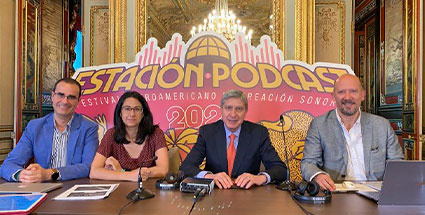
Digital audio and podcasts in Spain
The study 'How podcasts sound in Spain. In-depth analysis of the original production on digital audio platforms in 2022', carried out by the Nebrija Observatory of Spanish, has analyzed the current situation of podcasting in Spain.
Ver noticiaGoogle-Nebrija Dialogues 2. The future of audiovisual communication
The audiovisual market has taken a 180º turn in recent years. The European Audiovisual Communication Services Directive, which member countries had to implement in 2020, is the legislative response to this challenge. Its primary objective is to guarantee a fair European single market that adapts to technological advances. But how will this regulation be applied in our country?


